How to Write for TV
ULTIMATE Online Screenwriting Course
Learn everything about how to write for TV with our superior online screenwriting course.
Our ULTIMATE Write for TV course has now been taken by
over 10,000 writers and filmmakers!
10,000
online course learners

COURSE CASE STUDY: what made The Wire so great?
“I’ve been writing screenplays for 10 years+ and my writing partner and I sold our first TV script in 2013. We are both taking this class as a refresher course and so far I’ve found it to be extremely helpful. I highly recommend it to beginners as well as those who have been writing for a while but want to brush up on their skills.”

Deborah Major
Screenwriter

The Write for TV Screenwriting course was designed by a Warner Bros., Universal and Paramount script consultant
In the Write for TV course we’ll teach you how to…

Maximize Your Writing Time
Time – or the lack of it – is the great pain point of the screenwriter. You can’t develop all your ideas in to full scripts. You can’t write all day, because you’ve got a day job. With us you’ll learn the pro tips and tactics to get the most of yourself, and your time.

Network (Even If You Know No-One In Showbiz)
Building relationships is an absolutely fundamental part of being a screenwriter. Today, you have to hustle, as well as write well – there’s no other way. We teach you all the short-cuts and insider tactics.

Dodge Mistakes & Accelerate Progress
Working out how to start your career as a screenwriter is one of the trickiest parts of the process, both creatively and in a business sense. After taking our course, you’ll have a crystal-clear view of the pathway ahead, what to do, and crucially what NOT to do…

About The Fundamentals of Screenwriting
Screenwriting is a craft, but when you begin to unpick your favourite shows and movies it’ll soon become clear that there’s familiar methods, systems and narrative structures in play. After taking our course you’ll know screenplay structure, back to front.
I’ve tried writing courses in the past and have never found one that helped in the way this one has. It’s well structured and well thought out. I found it very easy to follow and I also found it easy to put the information I picked up in to practice. I’m now working on a script with more confidence than I had before.

Jack Send
Screenwriter
I took this course over a couple of months, which is one of the big advantages for me. I like to take my time and take things in, which you can’t do on a weekend residential course. Having gone at my own pace, I realised there was more to this course than I realised. It covers pretty much everything you need to know to produce and market a good screenplay.

Richie Shaw
Author
Screenplays are hard to get right if you don’t know what you’re doing. The course really helped me understand exactly what’s needed to plan in advance to make sure it runs smoothly. Thank you Industrial Scripts for helping me to develop my screenplay.

Jon Stuart
Writer
INDUSTRIAL SCRIPTS HAS BEEN FEATURED IN




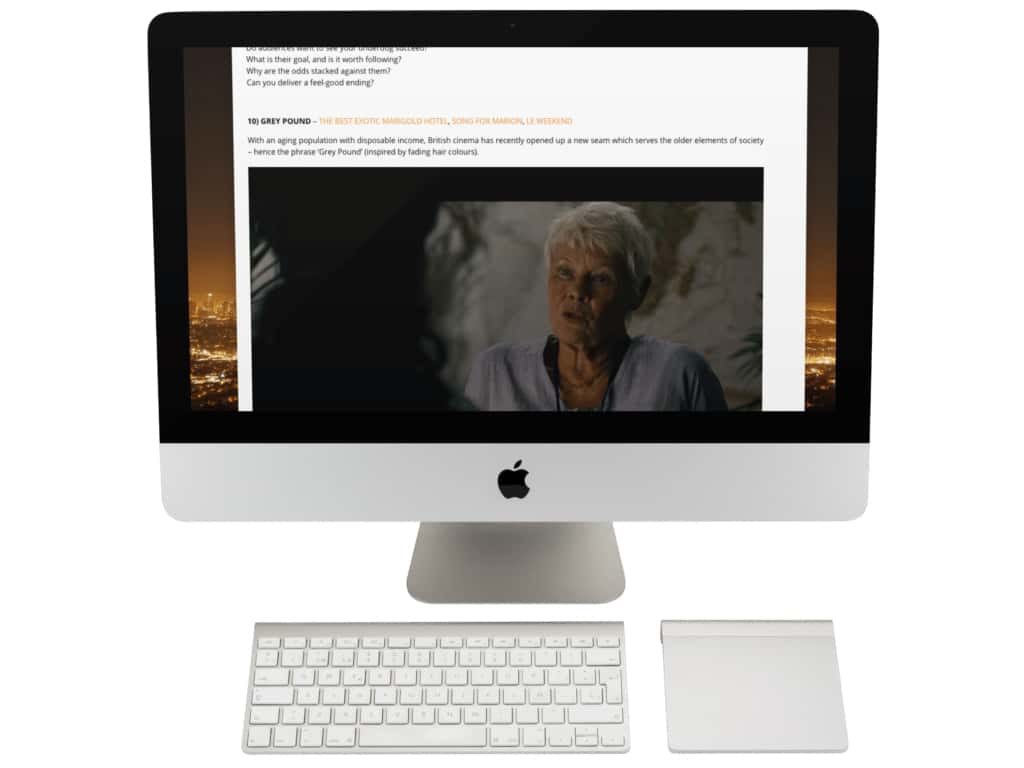
VIDEO – TEXT – QUIZZES – CASE STUDIES – EXERCISES
Our Courses Are a Mixture of Video, Text, Quizzes and Writing Exercises
Our courses have been deliberately designed to encourage writers to learn as they write. Ideally, you’ll complete a full TV pilot script as you work your way through the modules and lessons. Ultra-specific exercises that you can do even when you’re not online are peppered throughout the course, so you’re writing even on your daily commute!

Show me the money: in 2011 MAD MEN creator Matthew Weiner
scored a reported 3-year, $25-$30 million contract with AMC,
after a heated round of negotiations.
“I have published 10 novels (e-books) and I can’t believe the things that I didn’t know. I’m going to have to do some rewrites after what I’ve learned from Industrial Scripts.”

Sandy Rohan
Author & Screenwriter
Give Your Script The Best Start In Life…
The screenplay, so they say, is like a writer’s baby: you birth it, raise it, sustain it, and then release it in to the world. But there are so many pitfalls, both in terms of the artistic process, and The Industry. Skyrocket your odds of success with our Write for TV Course – you won’t regret it!
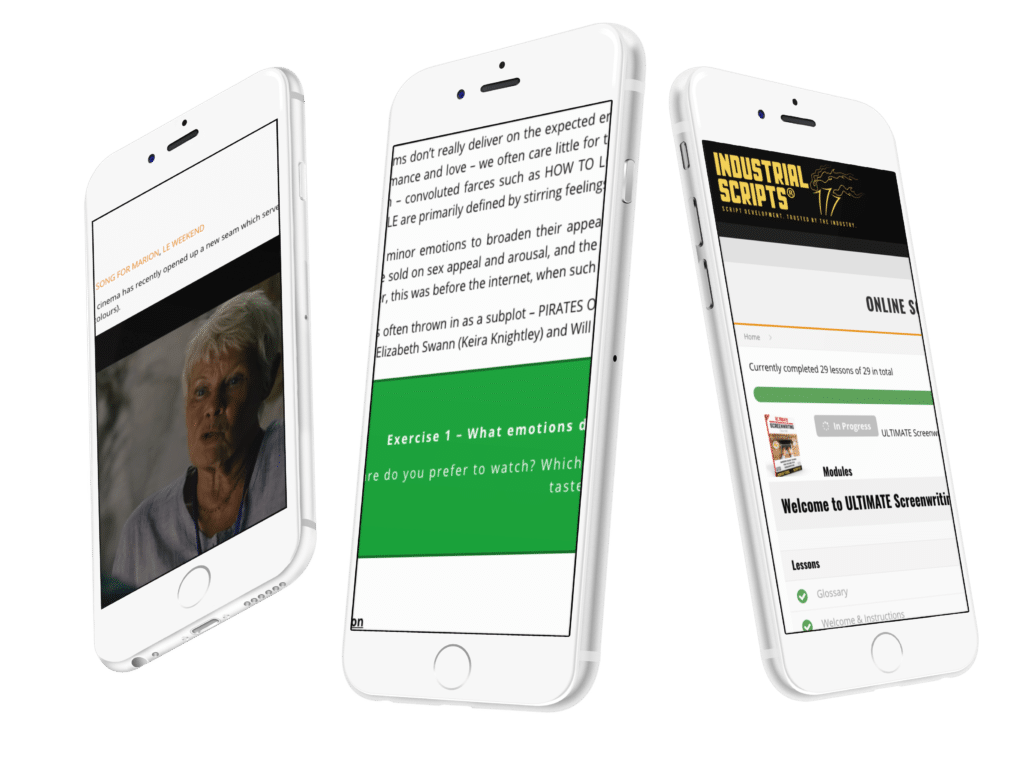
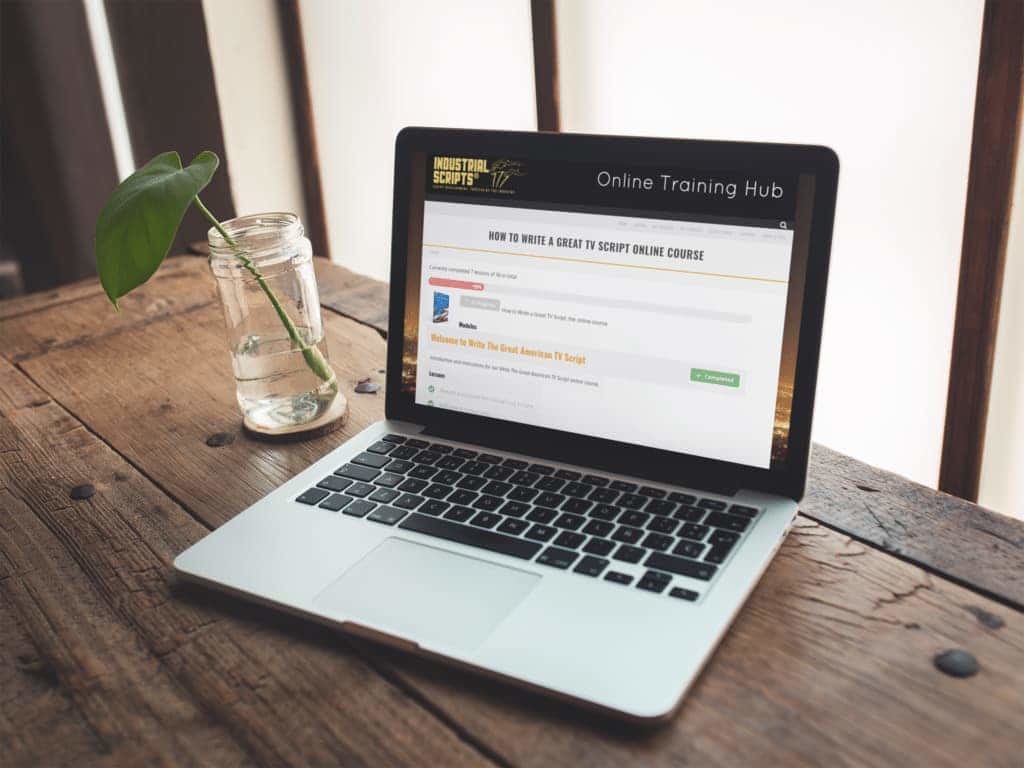
TRICKY QUIZZES KEEP YOU ON YOUR TOES
Our Unique Quiz System Pushes You to Absorb The Information
You probably think the quizzes in our Write for TV course are easy, right? Think again: we’ve made them deliberately tricky to keep you on your toes while you’re learning. Our system won’t let you move forward to the next lesson until you’ve nailed the quiz. True character is only revealed under pressure…

COURSE CASE STUDY: where did it all go wrong for Spielberg’s Terra Nova?
“In the last year I’ve completed their novel writing and online screenwriting course and now I’m about a third of the way through their TV screenwriting course. I think that the design and format of the course content demonstrates Industrial Scripts’ love of teaching – it’s so precise and thorough.”

Jean Nowell
Writer & Author
The Course Structure:
Modules > Lessons > Quizzes
Our Write for TV: ULTIMATE Online Screenwriting Course is divided into 6 core modules, which together consist of over 25 lessons.
The course puts an early emphasis on selecting strong concepts for your screenplay, before looking at major structural and character topics, and then drilling down to on-the-page script execution.

What You Get:
> Lifetime access to our epic online screenwriting for TV course.
> 6+ Core Modules, 26+ Lessons, Countless Exercises and Quizzes.
> Entertaining balance of video, text, exercise and quiz-based learning to keep you on your toes.
> Giant suite of bonus eBooks, unique guides, 40+ produced screenplays and more.
> From Industrial Scripts, the most reviewed script coverage company anywhere.
> Certificate of Completion.
“I’ve attended writing courses which are run by people who don’t know the industry. As you’d expect of Industrial Scripts, everyone involved in this course really does know what they’re talking about. I went back over what I had written as soon as I’d finished the course and found I could make it even better the 2nd time around…”

Debbie Eaton
Screenwriter
How to Write for TV – Course Structure
The course is broken down in to 6 core Modules, consisting of 32 individual Lessons. At the end of each Lesson there’s a Quiz element, and users need to pass the Quiz in order to advance to the next Lesson.
MODULE
A
Introduction: How to Write for TV
4 Lessons + Exercises + Videos + Quizzes
> The Basics of Television Writing – The Pilot and The Series Arc, Formatting
> What is Story? Definition and Crucial Components
> Stage of Screenwriting – Loglines, Index cards, Synopses, Treatment and Script
> Ideas – Generating, Judging and Testing
MODULE
B
The Television Landscape
3 Lessons + Exercises + Videos + Quizzes
> Genre – How it Works in Television, Defining Drama and Comedy
> Plot Types
> Platforms – Network, Cable, VOD, The Internet – how the platforms affect content and expectations.
MODULE
C
How to Write TV Drama
5 Lessons + Exercises + Videos + Quizzes
> The (Anti) Hero’s Journey – Why Bad Means Good, The Character Arc
> Case Study: BREAKING BAD
> The Multi-Protagonist Drama
> Case Study: GAME OF THRONES
> Character Development in Network Drama
MODULE
D

COURSE CASE STUDY: deep dive in to the mechanics of what drove Breaking Bad to become a global hit
How to Write TV Comedy
4 Lessons + Exercises + Videos + Quizzes
> The Many Faces of Comedy
> Case Study: THE BIG BANG THEORY
> Writing for a Niche Audience
> Case Study: LEGIT
MODULE
E
Building Your Narrative
4 Lessons + Exercises + Videos + Quizzes
> Conflict – The Building Blocks of Drama
> Shots, Scenes, Sequences & Building to the Commercial Break
> Exploring your Theme and Controlling Idea
> Characterisation through Action, Dialogue & Description
MODULE
F
Writing Your TV Show
7 Lessons + Exercises + Videos + Case Studies + Quizzes
> Planning your Teleplay
> Screenwriting Devices– Information Arrangement, ‘Setting the Table’, Repetition, Playing with Time
> Dialogue – Functions, Subtext, Differences between Platforms
> Description – Major Tips and Mistakes to Avoid
> Pace & Writing Visually
> Learning from Success (Case Study: THE WIRE)
> Learning from Mistakes (Case Study: TERRA NOVA)
MODULE
G
The Business of Writing for TV
5 Lessons + Exercises + Videos + Case Studies + Quizzes
> The Marketplace
> The TV Writer: From Room Assistant to Showrunner
> Getting Noticed
> Contracts and Pay
> Showrunner Case Studies
Bonus Study Materials + Guides
Get full access to our suite of unique study guides when you purchase any course. The pack includes…
6 x eBooks on challenging areas of screenwriting
3 x study guides on the industry and navigating it
Template agent & manager query letter
Detailed script coverage sample
40+ PDF Screenplays of Successful Movies
“The 20 Screenplays You Can Learn The Most From”
Script coverage templates
And more!
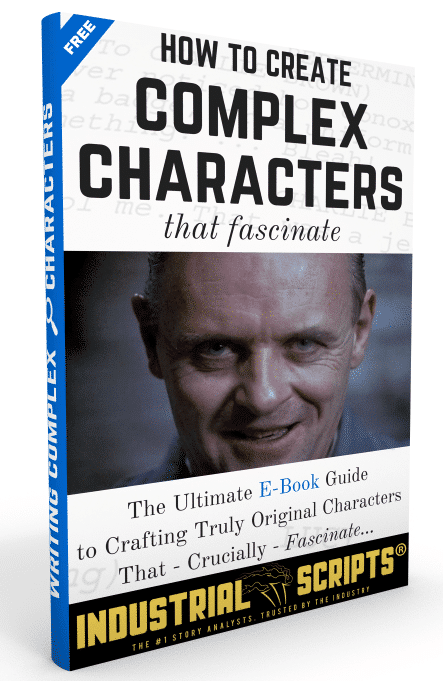
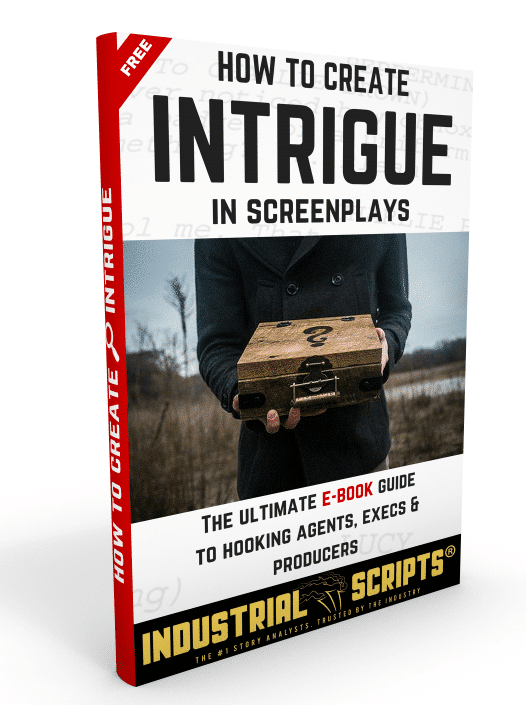
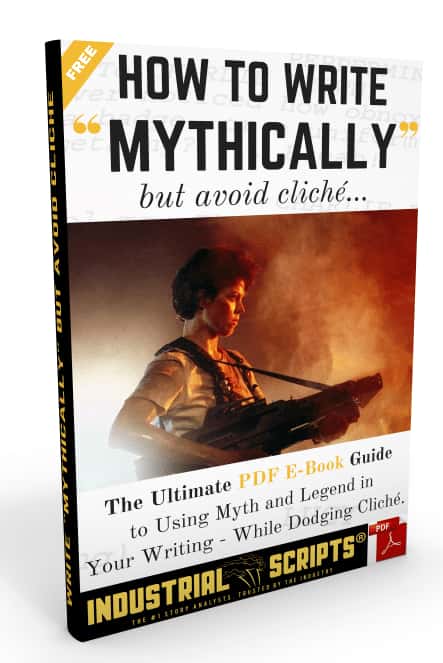
“Being staffed on a TV show is good money. REALLY good money…”

Defamer Magazine
Pictured: Ryan Murphy, who scored a $300m Netflix deal
SINGLE COURSE
Serious Writer
Purchase ULTIMATE Screenwriting Online and save yourself a hell of a lot of pain! We made all the mistakes you WILL make a long time ago, let us save you from them.

“Detailed without being over complicated, easily understood without being dumbed down this is THE ideal course for any student of screenwriting. It contains a wealth of information that is set out in a structured and entertaining way, with a huge amount of information conveyed in the lessons. Highly recommended.”

George Katz
Author-turned-Screenwriter
Start Living Your BEST
Writing Life Today
Life’s short: you’re not here to get rich, you just want to develop amazing screenplays, to work with characters day-in, day-out, tinker with dialogue, cut a line here, add some scene description there.
You’re a Screenwriter. You need to write for TV.
And the ULTIMATE Screenwriting for TV Course Is For You.

Don’t Worry, We’ve Got You Covered
If any of the information on this page turns out to be inaccurate or we don’t deliver what is promised then you can get a full refund at any time within 30 days of purchase, no questions asked. Simply raise a support ticket here detailing how the information is inaccurate and we’ll refund you within 7 days.

Industrial Scripts
Specialist Script Developers Since 2010
About Industrial Scripts®
Founded in 2010, Industrial Scripts is today one of the world’s leading screenwriting companies, backed by major companies and with over 1,000 verified testimonials.
Our script consultants have significant industry credentials, writing coverage for companies and studios including Paramount Pictures, Warner Bros., Universal and many more. Working with screenwriters and filmmakers of all levels and from myriad locations, we also deliver intensive training both online and offline.
While our free Talent Connector promotes talent to the industry, our popular blog – Character-Driven – educates and entertains. We believe that rigorous script development is the foundation of great film and TV and is, indeed, essential.
Without it, the end product will fail.
Frequently Asked Questions
Got questions? Here are the most common queries we’re sent about the course…
How long do I get access for?
Through purchasing the course you’re guaranteed lifetime (or as long as the course exists/is on sale, and we have zero intention of folding it!) access. You can take it once, twice, three times…or as many times as you want.
Is the course mobile-friendly?
Whilst it’s possible to take the course on tablets and mobile devices, you’re going to get the best experience taking it on Google Chrome, on a stable broadband connection.
Do I have to write a full script while taking the course?
Whilst we highly recommend writing AS you move your way through the course modules, it’s not essential. Invariably you’ll have a lot of ideas for TV shows while taking it, so we strongly recommend jotting down notes and keep track of all your loglines as you go.
How many hours does it take to complete the course? Is there “live” feedback, or a human teacher involved at all?
If you complete a full 30 or 60 page screenplay as advised, we’d estimate that completing the course and script will take in excess of 100 hours. And that’s before you get to the Bonus Materials. On the flip side, if you want to speed through the course that is probably achievable (though not recommended) within 20 hours. The course is a self-learning one, exclusively. No live teaching is included. Our innovative quiz system keeps you on your toes, self-marks you, and checks you’re absorbing the information correctly.
I’m brand new to screenwriting, is the course for me?
100%. Our course is structured and aimed specifically at new screenwriters just starting out, and intermediate ones who maybe have lost their way and need a refresher. Don’t worry, as long as you’ve seen a solid number of movies in your life (which you surely have, if you’ve got this far) the course will give you the solid foundation you need.
Do I need special software to write my script?
Whilst it’s not absolutely essential to write using specialist screenwriting software, life is going to be a lot easier if you do. Final Draft is the industry’s go-to choice in terms of software which formats your script correctly as you write. However there are plenty of free and paid alternatives.






I’ve been trying to convert a story I wrote in to a script and I’ve really struggled. Where I could add descriptive text to a story, i can’t in a script. So how do you create drama with just narrative? thankfully I got the help I needed through this course. It’s not an easy thing to do but I do now know how to think it through to make sure my narrative will give have the right effect on screen. I do find it hard when there’s no on to tell me what I’m doing right or wrong though, so it would be nice to have some avenue to gain feedback.
When I think about a TV script I think about ‘a’ script but of course in most cases it’s one of a series, and they all have to relate to each other. The series arc is nothing I’d heard of before and provided me with a better insight when it comes to tv script writing. My only concern was the overall cost of the course, but I know there are other course that charge more and provide less information. As an investment in my future I hope it pays off.
Ever since I can remember I’ve wanted to write for TV so I jumped at the chance to take this course. I have a number of ideas for scripts but needed guidance as to the best way to put them together to get noticed. While there is plenty of help throughout the course, I found the case studies to be the most help with this. Seeing the finished product and how it came to be provided useful insights, particularly with Game of Thrones.
My script is a little different to the norm and is definitely for a niche market. There was a section about writing for a niche audience but I felt this could have been a bit bigger. Lots of the other information I could use so, so overall a very positive experience from this course.
I’ve been toying with a few ideas, wondering whether to combine them or make them totally separate stories. I used the information in this course to test my ideas and was surprised at what I found out. I now have two scripts I am working on, neither of which are entirely like I originally planned. I’m hoping my research is right and that they both turn out well when I’m finished.
Useful insider tips. The case studies provide a good insight in to what the networks are looking for and the section all about character development in network drama had a lot of very useful information to help with this. It changed the way my script is now being developed.
Having read “A Song of Ice and Fire” and watched Game of Thrones I was absolutely fascinated with the case study. Watching the book come to life was interesting enough, but learning the ins and outs of the screenwriting really did show me a lot about what’s involved.
I’m currently working on a very complex script involving a number of characters who work together. I’ve been finding it very difficult to get them to work together on screen, so the module involving multi protagonists was a huge help to me.
Finally a way to find out how to get all my ideas together and use all the scraps of paper I have with notes written on, to produce a script. I really had no idea how to go about setting my script out so ‘Planning your Teleplay’ was the first module I went to. I did go back over the others which were before this but I was able to start putting everything together as I went along.
Most of my favourite TV shows are American so this course was great to teach me how to target a script. I love Big Bang Theory, having watched it from Day 1 so I was intrigued by the case study. Having done that I can now see how each episode is put together. Fascinating course, and maybe one for the UK market too?
I’m very interested in how the internet is now being used a platform for TV. I’ve watched a few shows over the internet and I was hoping to pitch my finished script for that medium. I was very happy to see that this was covered as part of this course and I got a lot of very useful information about it. Many thanks.
What I liked most about this course is that there is a good mix of information for both comedy and drama. While the basics will still be the same they are both aimed at different markets. This was shown in the case studies. The Big Bang Theory and Game Of Thrones were two great examples to choose.
Narrative isn’t everything with a script, as I found out when I read mine through. The information provided in this course really helped me to get to grips with how to add descriptions and set the scene. I am now rewriting my script with what I have learned.
I had an idea for a one off TV script. I use the course to format and write it as a pilot episode. I was then stuck as to how to proceed and turn the idea in to a series. I got a lot of ideas and suggestions which I am using to come up with ideas to develop. While there is information about sending off your completed script, I’d like to have some idea of the companies to approach for different genres and ideas.
The case studies are the best thing about this course, particularly as it shows one which is labelled ‘learn from mistakes.’. I never saw Terra Nova but having seen the case study and found a few episodes to watch, I can clearly see the difference between right and wrong. Sometimes very subtle things too. Hopefully this course has steered me in the right direction.
For me the internet is the future, so learning how to pitch my script for that market was important to me. Learning the different markets that are out there are well was very interesting and obviously helpful. If one market isn’t interested, another may be. Well structured course, with both new information and some I already knew.
One of the things I hate most when watching something on TV is the sudden appearance of a commercial. These are often just ‘stuck in’ in what seems to be a good place. So I was very happy to see that this course has a section dedicated to how to build the tension up to a natural break for a commercial. For me that makes a programme much easier to watch and the help makes it easier to write.
I never realised that there was more than one type of plot, but now I’ve completed my course, it’s pretty obvious. This is the sort of information I was looking to get: Things that you just don’t think about. While I think I already knew a lot that was in here, (probably because I’ve attended smaller, amateur courses) I still think this was great value for money.
I was interested in the case studies, as these always provide information which is totally relevant to getting your script noticed and produced. While I can’t say I wasn’t pleased with what I got from all of them, it would have been nice to have been able to see a case study of a more niche programme, or maybe one that isn’t quite so well known.
I used the case studies for ‘Game of Thrones’, ‘Big Bang Theory’ and ‘Terra Nove’ to look at the different ways to write comedy, drama and fantasy. I found all the case studies really added something to the course and were a good source of information.
I love the phrase ‘setting the table’ and I really thought this was a fun module. I really enjoyed playing with my ideas and getting everything in the right order at the right time. It made my script come to life before I even started it! lovely course.
Before spending hours working in a script, I wanted to find a way to see if I could get opinions on my idea first. In this course there is a section which gave me some suggestions how I could do this which was very helpful to me. In finding out what may or may not be popular it meant I could develop my story in the right direction to allow for future plots to develop. There was a lot of other information as well about how to market and send off your script when completed. All very useful.
Having an idea for a script is one thing. Having ideas to keep it going is something else and this is what I got from this course. It really helped finding out about the components which are crucial to a good story. This alone gave me more ideas to make sure my script had more than just one plotline available to it. Plenty of help with ideas and finding out if they may or may not work too.
I’m working on a comedy series and to me comedy is just something that makes you laugh. It’s become a lot harder since the section about the many faces of comedy, but in a good way. There is a lot to think about with comedy: target audience, age, visual or written comedy. I’ve now got my script in to one niche and it’s one I’m comfortable to develop as well.
In the series of scripts I’m currently working on, I have 3 protagonists. The plot will revolve around a different one each week, with the other two keeping in the background. I didn’t find this easy to do as the personalities were all dominant. I am now a lot clearer on how to do this and I’m watching other series where this happens which a much more critical eye.
I have an idea for a sci fi series which I am working on with the help of this course. The particular area I have chosen is quite a niche audience and I know how hard it can be to write something like this to make it appeal to everyone. I did find the section about writing for a niche market useful but it would have been even better if the marketing advice later on included ideas on who are the most likely to accept this type of work. There is help there, but on something like this, I know not all networks will appreciate it.
I think I did this the wrong way round. I was so fascinated by the case studies that I read the one for Terra Nova and then went to watch the series. I had no idea what it was about but I followed the case study as the series progressed and found it extremely informative. In fact I was so engrossed in this that I left my own script writing for a while. I did enjoy the course and the good thing is that you have the freedom to go at your own pace and repeat any sections which you are unsure of. Unfortunately for people like me this can also be a drawback as it can be hard to motivate yourself sometimes.
With a TV script it’s not usually a one off but just one of a series of scripts. I found I had to rework what I’d written as the course explained this to me and helped me understand how to develop my characters over a series of weeks. I actually felt that this really helped me with my plots and storylines as I could spend time developing those while my protagonist developed slowly. Lots of detail, lots of information which can be put in to practice but I’d simply like more. There were odd points which were covered which I personally feel would benefit from a little more explanation, even though you can still understand what’s being said. I’m rating 4.5 overall.
Writing for television is difficult at the best of times so it really helps to do a course like this one. I read and read the section which explaine how it works in television as to me this is the most important thing to understand before starting work on any script. I read the course through twice before actually attempting to write anything as I like to make sure I understand things first to cut down on edits and rewrites.
From the start I knew I’d be picking up things I’d never considered, such as a pilot episode. This has to be taken in to consideration as a script on its own. This also served as a good test script to make sure I got the formatting and style all done correctly too. A nice, well planned course which did help me finish my script.
Watching Game of Thrones inspired me to start putting some of my ideas on to paper to come up with something suitable for television. I was, therefore, overjoyed to find that this was included as a case study. As my script is very much of the same genre, it’s something I am revisiting regularly to make sure I get my script just right.
When you watch TV you never really think about everything that’s involved. I thought I knew how to write a story until the early section of this course, which goes in to a lot of detail, explaining what a story is. As a result I sat back and made some notes and now I’m confident that I have a lot more depth, not just to my story, but to my characters as well.
Terra Nova is an amazing show so I’ll admit that the case study was the first thing I went to. Seeing something on screen and in writing are two totally different things and being able to see how this program was put together is something else again. I think this case study taught me more than I expected.
I want to turn a story I’ve written in to a script. It really isn’t as easy as I thought so I’m glad I found this course. The one thing I was struggling with was not being able to describe anything which made it difficult for me to get my characters across properly. This showed my how to do that with action and dialogue and now my characters are coming to life again.
I learned a great deal from this course. Unless you understand the technicalities, your script simply won’t work. What interested me was learning about how to turn a normal script in to a television one. Creating a natural break for a play differs from a commercial break and learning how to do this will be of great use. There was further information regarding scenes and how to shoot for television and adding this information to the plot and characterisation, my script will hopefully get me noticed.
When I sat down to start a script, I realised I had no idea how to go about it. I found this course and like the idea of working at my own pace. I had an idea for a plot, but it wasn’t until I read the module. which included logline and index cards that I realised just how different this is to anything I’ve written before. This is the sort of information which can save hours of rewriting.
I’ve read a bit previously about character development but my protagonist was a little too good to be true and coming across as very bland. There is a section in this course which deals with that and it helps you to get the right balance between good and bad characteristics. Now my hero has all the good points he needs with just a few little ‘naughty’ tweaks to make him a little more believable.
I’m really trying to develop my writing skills and this was the next step for me. Mad Men is one of my favourite TV shows so I really wanted to see the case study on this one. I wasn’t disappointed with it. It really helps being able to watch something after reading this as it helps to visualise what you’re writing. A well planned course.
I’ve been trying to write a comedy script. I have the idea but Iv’e been struggling with making the comedy look ‘natural’. I love the Big Bang Theory so I was over the moon to see that was used as a case study. Everything looks so natural on the screen, and now I know what I need to do to make mine look the same. I’ve always written humour and that’s what I want to continue to work on. Now when I watch Sheldon, I see myself looking at how they developed the script.
A very detailed course which goes beyond mere outlines. The tasks are well prepared, and fulfilling if you decide to engage with them. They enable you to further understand the lessons and really develop the skills that you learn throughout the lessons.
Everything you ever wanted to know about TV Screenwriting, in online form. Take it from home. Take it from the train. Take it at your own speed, and maximise your learning.